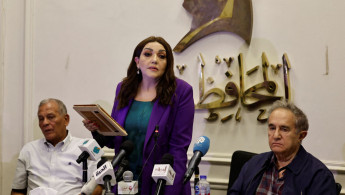Egyptian opposition politician Kassem begins hunger strike
Egyptian opposition leader Hisham Kassem has begun a hunger strike while he stands trial on slander and verbal assault charges, his lawyer said on Saturday.
The publisher had been charged last month with slander of a former minister, then later also charged with verbally assaulting officers at a police station after he was brought in, charges his allies say are politically motivated.
The arrest of Kassem, who previously published the newspaper Al-Masry Al-Youm, came after he made sharp criticisms of Egyptian President Abdel Fattah al-Sisi and founded a liberal coalition called al-Tayar al-Hurr, or Free Current Movement, which has said it could field a candidate in upcoming elections.
While economic troubles have stirred some discontent among many Egyptians, the coalition is not seen as posing a major threat to Sisi, who is expected to run for his third term in elections early next year.
Kassem appeared in court behind bars on Saturday when his trial, including requests by his defense team to be granted bail and to view case files, was postponed until 9 September, state news agency MENA reported.
Kassem appeared "very tired," lawyer Nasser Amin said.
Earlier this week, Free Current politicians said the case against Kassem was politically driven and called for Sisi to be replaced.
Egypt has cracked down on political dissent under Sisi, who took power after leading the 2013 ouster of the Muslim Brotherhood's Mohammed Morsi. Under his leadership Egypt has arrested tens of thousands of people including prominent challengers in past elections.
The government says the arrests were on national security grounds.
The government has sought to address freedom and human rights issues in recent years, including opening what it called a "national dialogue" with civil society leaders and granting amnesty for some prominent prisoners.
Critics have dismissed the measures as cosmetic and say arrests have continued.
(Reuters)





 Follow the Middle East's top stories in English at The New Arab on Google News
Follow the Middle East's top stories in English at The New Arab on Google News

![MP Essam Diab's pursuit to block TikTok in Egypt has revived an already ongoing debate in the country. [Getty]](/sites/default/files/styles/image_330x185/public/1230748046.jpeg?h=a5f2f23a&itok=-8MqBLLC)
